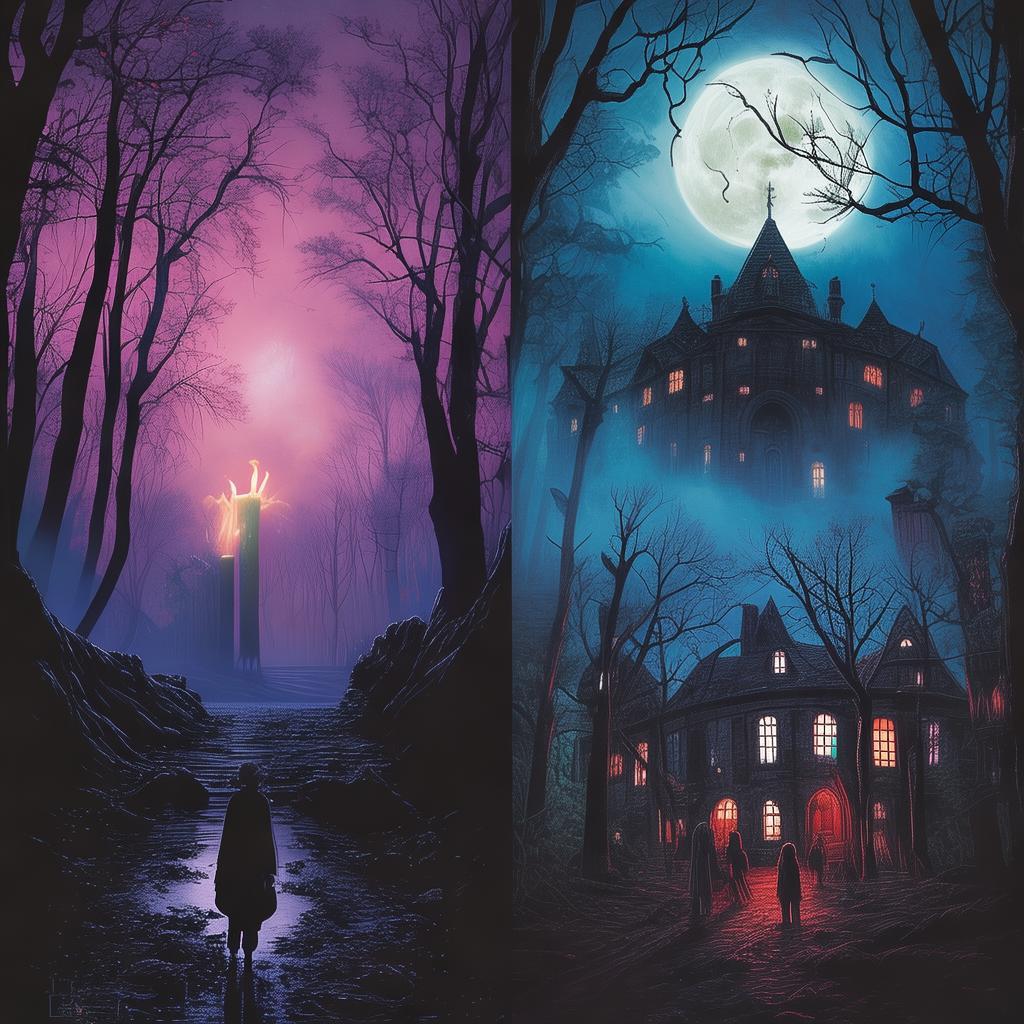The Audible Tomb: Echoes of the Past
In the heart of the ancient, secluded village of Lushan, there stood an old tomb that had been forgotten by time. It was nestled among the gnarled trees and overgrown bushes, its stone walls weathered and moss-covered. The villagers spoke of it in hushed tones, their voices tinged with fear and reverence. They said that the tomb was haunted, that it was the final resting place of a man who had met a tragic end, and whose spirit remained trapped within, seeking release.
Among the villagers was a young woman named Mei, whose life was a tapestry of solitude and sorrow. Her parents had died in a mysterious accident, and she had been left to fend for herself. Mei worked as a librarian, spending her days surrounded by books that whispered tales of the past. It was there, in the quiet of the library, that she stumbled upon an old, leather-bound book that spoke of the tomb in Lushan.
The book, titled "The Audible Tomb," detailed the story of a man named Li, who had been falsely accused of a crime he did not commit. Condemned to death, Li was buried alive, his spirit trapped within the tomb, unable to escape. The book described the tomb as a place of haunting whispers, a place where the past and the present collided in an eerie dance.
Mei was fascinated by the story, and she decided to visit the tomb. She knew it was a dangerous journey, but she felt a strange pull, as if the spirit of Li was calling to her. Accompanying her was a curious and somewhat skeptical historian named Wang, who had heard the legends of the tomb and was determined to uncover the truth behind the ghost stories.
As they approached the tomb, the air grew colder, and the trees seemed to whisper secrets of the past. Mei felt a chill run down her spine, but she pressed on, her resolve strengthened by the knowledge that she was on a mission to uncover the truth.
When they reached the tomb, Mei noticed that the stone slab that covered the entrance was slightly ajar. She pushed it open, and the sound of rustling leaves and distant birdsong filled the air. The tomb was dark, but Mei and Wang could see that it was filled with ancient artifacts and the remnants of Li's life.
As they ventured deeper into the tomb, they heard faint whispers, as if the very walls were speaking. Mei's heart raced, but she pressed on, her eyes scanning the room for any sign of the spirit of Li.
Suddenly, the whispers grew louder, and Mei felt a presence behind her. She turned to see a figure standing in the shadows, his eyes glowing with an eerie light. It was Li, the man whose story had been told in the book.
"Who are you?" Mei asked, her voice trembling.
"I am Li," the spirit replied, his voice echoing through the tomb. "I have been trapped here for centuries, seeking release. You have come to me at a time when my story must be heard."
Mei and Wang listened as Li recounted his tale, a tale of injustice and sorrow. He spoke of his love for his wife and children, of the pain he felt as he was buried alive, and of the hope that he had held onto until the very end.
As Li spoke, Mei felt a connection to him, a bond that transcended time and space. She realized that she had been chosen to help him find peace, to help him break free from the tomb that had held him captive for so long.
With Wang's help, Mei began to research the events that led to Li's death. She discovered that the man who had framed Li was none other than the current village leader, a man who had used his power to silence the truth.
Armed with this knowledge, Mei and Wang confronted the village leader, demanding justice for Li. The leader, caught in a web of his own making, was forced to admit his guilt and apologize for his actions.

With the truth exposed, Li's spirit was finally free. He thanked Mei and Wang for their help, and as he faded away, Mei felt a sense of relief and closure.
The tomb, once a place of fear and mystery, became a symbol of hope and redemption. Mei returned to the library, her heart filled with a newfound purpose. She knew that the story of Li was just one of many that had been lost to time, and she vowed to continue her search for the truth.
The village of Lushan began to change, as the people learned to embrace the past and move forward with hope. Mei's actions had not only freed the spirit of Li but had also opened the eyes of the villagers to the importance of truth and justice.
And so, the tomb in Lushan remained, a silent witness to the past, but no longer a place of fear. It was a reminder that the echoes of the past could still be heard, and that sometimes, it was up to us to listen and respond.
✨ Original Statement ✨
All articles published on this website (including but not limited to text, images, videos, and other content) are original or authorized for reposting and are protected by relevant laws. Without the explicit written permission of this website, no individual or organization may copy, modify, repost, or use the content for commercial purposes.
If you need to quote or cooperate, please contact this site for authorization. We reserve the right to pursue legal responsibility for any unauthorized use.
Hereby declared.









